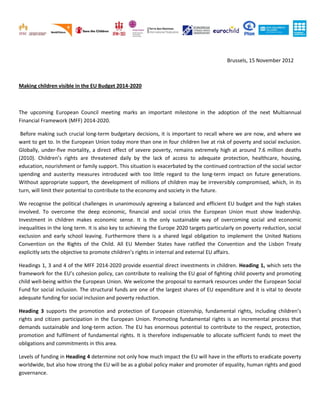
Making Children Visible in the EU Budget 2014-2020
- 1. Brussels, 15 November 2012 Making children visible in the EU Budget 2014-2020 The upcoming European Council meeting marks an important milestone in the adoption of the next Multiannual Financial Framework (MFF) 2014-2020. Before making such crucial long-term budgetary decisions, it is important to recall where we are now, and where we want to get to. In the European Union today more than one in four children live at risk of poverty and social exclusion. Globally, under-five mortality, a direct effect of severe poverty, remains extremely high at around 7.6 million deaths (2010). Children’s rights are threatened daily by the lack of access to adequate protection, healthcare, housing, education, nourishment or family support. This situation is exacerbated by the continued contraction of the social sector spending and austerity measures introduced with too little regard to the long-term impact on future generations. Without appropriate support, the development of millions of children may be irreversibly compromised, which, in its turn, will limit their potential to contribute to the economy and society in the future. We recognise the political challenges in unanimously agreeing a balanced and efficient EU budget and the high stakes involved. To overcome the deep economic, financial and social crisis the European Union must show leadership. Investment in children makes economic sense. It is the only sustainable way of overcoming social and economic inequalities in the long term. It is also key to achieving the Europe 2020 targets particularly on poverty reduction, social exclusion and early school leaving. Furthermore there is a shared legal obligation to implement the United Nations Convention on the Rights of the Child. All EU Member States have ratified the Convention and the Lisbon Treaty explicitly sets the objective to promote children’s rights in internal and external EU affairs. Headings 1, 3 and 4 of the MFF 2014-2020 provide essential direct investments in children. Heading 1, which sets the framework for the EU’s cohesion policy, can contribute to realising the EU goal of fighting child poverty and promoting child well-being within the European Union. We welcome the proposal to earmark resources under the European Social Fund for social inclusion. The structural funds are one of the largest shares of EU expenditure and it is vital to devote adequate funding for social inclusion and poverty reduction. Heading 3 supports the promotion and protection of European citizenship, fundamental rights, including children’s rights and citizen participation in the European Union. Promoting fundamental rights is an incremental process that demands sustainable and long-term action. The EU has enormous potential to contribute to the respect, protection, promotion and fulfilment of fundamental rights. It is therefore indispensable to allocate sufficient funds to meet the obligations and commitments in this area. Levels of funding in Heading 4 determine not only how much impact the EU will have in the efforts to eradicate poverty worldwide, but also how strong the EU will be as a global policy maker and promoter of equality, human rights and good governance.
- 2. The budget ceilings proposed by the European Commission must be respected. The shares of Headings 3 and 4 in the overall EU budget represent only 1 and 7 % respectively. Funding for development cooperation is only approximately 2 % of the MFF. Any cuts in Headings 1, 3 and 4 would hinder the EU’s capacity to implement its policies and legislation, and have a hugely negative impact on the main beneficiaries of EU support. The Children’s Rights Action Group (CRAG) representing the voices of millions of children in and outside the EU urges Member States to: Maintain the level of expenditure for the overall MFF proposed by the European Commission. Ensure sufficient spending goes to children in particular in the areas of smart and inclusive growth, fundamental rights, security and citizenship, and in global Europe. Recognise the need for and ensure investment in children including protection, access to health and education, development and growth in a safe environment in Europe and in external relations of the EU. Promote social inclusion and combating poverty, in particular child poverty, through all EU structural funds. Ensure development aid levels that have a true impact on poverty eradication. CRAG counts on the European Council not to leave the most vulnerable in society behind. The economic and financial crisis should not detract attention away from the core purpose of EU funds: to add value to Member State action, to fulfil EU responsibilities, and to ensure quality of spending. Better and more efficient spending can be achieved through investment in children. Sufficient expenditures on children will have immediate and lasting impacts on the whole of society. We remain hopeful that the EU will defend a future budget that makes a difference for children. The Children’s Rights Action Group (CRAG) is a partnership of International NGOs including Eurochild; European Federation for Street Children; the European Juvenile Justice Observatory; European Youth Forum; International Falcon Movement; Platform for International cooperation on Undocumented Migrants; Plan International; SOS Children’s Villages International; Save the Children; Terre des Hommes International Federation; World Scout Bureau; World Association of Girl Guides and Girl Scouts (Europe Region); World Vision; Human Rights Watch. The CRAG aims to ensure that children’s rights are protected, respected and fulfilled both in the internal and external dimensions of EU policies and legislation, in accordance with the UN Convention on the Rights of the Child (UNCRC) - the world’s most ratified treaty, notably signed and ratified by all EU Member States.
